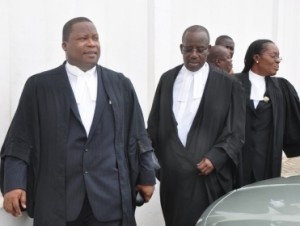- Home - News
- TWI News | TV
- Polls
- Year In Review
- News Archive
- Crime & Punishment
- Politics
- Regional
- Editorial
- Health
- Ghanaians Abroad
- Tabloid
- Africa
- Religion
- Election 2020
- Coronavirus
- News Videos | TV
- Photo Archives
- News Headlines
- Press Release
General News of Tuesday, 9 July 2013
Source: Joy Online
Petitioners' request for KPMG to audit 1,545 thrown out
Supreme Court has dismissed a motion filed by the petitioners to get KPMG to make a unique count of 1,545 pink sheets that were not included in the total of 8,675 sheets certified by the accounting firm.
KPMG had excluded this number because they claimed the markings on them were unreadable. But their report also added the court could give further directions on how to proceed with these contentious pink sheets.
The motion was, therefore, tabled to operationalize the needed direction on Day 41 of the hearing of the election petition, Tuesday.
In his submission, Philip Addison counsel for the petitioners went further to say that in the report, there are pink sheets found in the president's set but not in the registrar's.
He was convinced that if these unique counts are made, it will be clear for all to see the number of polling stations filed by the petitioners and that will greatly assist the court.
The petitioners said the application has been necessitated because these matters if not addressed, leave the KPMG report incomplete. Mr. Addison maintained that the application was meant to “tie up loose ends in the report”.
He noted that what KPMG’s action amounted to exclusion of evidence. Even the respondents are not complaining that they cannot identify to particular pink sheets, it is only the referee who is saying he cannot properly identify them, he argued.
He also said the respondents cannot suffer any “injury” as a result of conducting this additional audit by KPMG.
Respondents’ arguments
Mr. Bassit Bamba, Counsel for first Respondent, President John Mahama, on the other hand argued that, this request was beyond the mandate of the referee. He said the order by the court was specific. Mr. Bamba reasoned that KPMG was to do a true and faithful count of pink sheets and not to establish the identity of pink sheets as the petitioners' motion sought to do.
After all, the petitioners know what they filed, he concluded.
James Quarshie-Idun, Counsel for the E.C also submitted that the motion was going to delay the case. He reiterated that it was the petitioners' responsibility to prove their case and not to shift the burden of proof on KPMG.
Tsatsu Tsikata counsel for National Democratic Congress catalogued the petitioners' opposition to the count when they first applied to the court to order it. He added that they have opposed KPMG’s report and are now requesting the referee to help their case.
He said what the petitioners are seeking to do would add nothing relevant in determining the outcome of this case.
The ruling
The court after a long recess returned with a ruling. It read:
The referee’s report is auxiliary to the court. The court has a primary duty to adjudicate the case.
Since the materials upon which the petitioners are standing on are the same as they themselves filed in this court, their imposition to demonstrate with these materials (the pink sheets) by their own analysis with the aid of the referee’s report, the respective heads of the alleged malpractices in their case.
Any perceived difficulty still lingering can be cleared through cross-examination of second respondent.
To facilitate matters, we direct that the petitioners list out the 1,545 polling stations which they claim they have been able to identify despite the unclarities for the second respondent to respond.
Subject to this, the application is dismissed.











